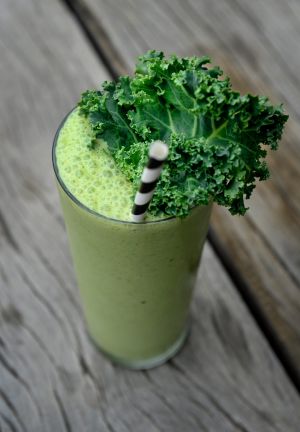
Enjoy a kale-filled smoothie if you desire, but remember the best way to live a non-toxic life is to work out and eat a wide variety of foods. Photo: Penny Stephens
From a scientific standpoint, there’s no good reason to do a “detox” unless you’re in rehab. No amount of juicing will atone for the health sins of 2014, and you might be doing yourself more harm than good.
It would be great if the right combination of freshly squeezed juices could make us all healthier and happier, but that just isn’t the case. This isn’t news: As quickly as juice cleanses have emerged as a popular diet option in recent years, scientists have emerged to debunk their usefulness.
For starters, the idea of a need for a detox — that your body is full of things that shouldn’t be there, and can be flushed out by more “natural” food and drink — is a tad misguided. From The Telegraph:
One misconception confronted in the report is the notion that “you can lead a chemical-free life.” This is clearly wrong because everything is made of chemicals, and so claims that products are “chemical-free” are not true.
A report on the Greenpeace International website states: “If someone came into your house, mixed you a cocktail of chemicals and offered it you, would you take them? Of course not.
“You wouldn’t want untested chemicals in your home, your drink or your body. You don’t want them but, shockingly, they’re already there.”
Derek Lohman, an inorganic and radio chemist, said: “If someone came into your house and offered you a cocktail of butanol, iso amyl alcohol, hexanol, phenyl ethanol, tannin, benzyl alcohol, caffeine, epigallocatchin and inorganic salts, would you take it?
“It sounds pretty ghastly. But tea is a complex mixture containing the above chemicals in concentrations that vary depending on where it is grown.”
“Let’s be clear,” Edzard Ernst, emeritus professor of complementary medicine at Exeter University, told The Guardian, “there are two types of detox: one is respectable and the other isn’t. . . . The [use outside of drug rehabilitation] is the word being hijacked by entrepreneurs, quacks and charlatans to sell a bogus treatment that allegedly detoxifies your body of toxins you’re supposed to have accumulated.”
Here’s the thing: Your body is designed specifically to detoxify itself 24/7. If bad things could just build up infinitely in an otherwise healthy individual, we’d all be done for. And there’s no evidence that drinking extra water or consuming certain foods speeds up this process in the least. If you’ve got the feeling that your kidneys aren’t pulling their weight, you don’t need a week of juicing – you need to see a doctor.
But for most people, doing a detox regimen – especially during peak New Year’s Resolution season – is about getting healthier (and usually thinner) in general, not just cutting down on dangerous “chemicals.” So is there any reason to chug kale juice exclusively for a few days?
Fasting (which is what you’re doing if you’re living on juice, come on) can actually make it harder for your body to go about its natural “detoxing” processes. If you’re eating less food, you’re having fewer bowel movements and that’s where most of the unfriendly stuff is supposed to end up. Fasting can also slow down your metabolism, so it’s not a good choice for weight loss either. And doctors warn that those in poor health shouldn’t fast, so it’s not a great thing to jump into after a month-long holiday binge.
There’s nothing wrong with wanting to start 2015 off nice and healthy, but don’t let the thrill of self-deprivation – or misplaced trust in a high price tag – fool you into taking the detox route. Enjoy a kale-filled smoothie for breakfast if you so desire (full disclosure: I certainly do), but remember that the best way to live a non-toxic life is to work out and eat a wide variety of foods – not spend a week slurping down beet juice.
Washington Post
